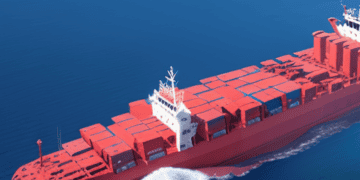The global shipping industry faces a new challenge as the Red Sea, a critical maritime route, experiences heightened disruptions. These disruptions, attributed to the ongoing Houthi rebel activities in the region, are causing significant impacts on the supply chain, surpassing the disruptions witnessed during the early stages of the COVID-19 pandemic. This was the key finding of a recent analysis conducted by the maritime advisory firm Sea-Intelligence.
The analysis highlights a substantial drop in vessel capacity in the Red Sea, marking it as one of the most significant decreases in recent history. This decline is second only to the impact caused by the “Ever Given” incident, where the colossal cargo ship was lodged in the Suez Canal for nearly a week in March 2021. The blockade of the Suez Canal, a pivotal waterway for global trade, had then caused a ripple effect across global supply chains.
As the situation unfolds in the Red Sea, its implications are far-reaching, affecting not only the shipping and logistics industries but also the broader aspects of international trade and market stability. At the time of the report, there was a noticeable effect on financial markets, with the US Dollar Index (DXY) trading at 103.17, a slight decline of 0.08% on the day.
This ongoing crisis in the Red Sea underscores the vulnerability of global supply chains to geopolitical events. The strategic location of the Red Sea as a conduit for international shipping, especially between Europe and Asia, means that any disruption can have immediate and widespread consequences. This situation is a stark reminder of the interconnected nature of global trade and the need for robust risk management strategies within the supply chain and logistics sectors.
Moreover, the Sea-Intelligence report raises concerns about the long-term implications of such disruptions. The potential for prolonged or repeated incidents in key maritime routes like the Red Sea could compel shipping companies to reevaluate their routes, potentially leading to longer transit times and increased costs. Such changes could ripple through the supply chain, affecting everything from inventory levels to consumer prices.
In conclusion, the Sea-Intelligence report highlights a critical aspect of modern supply chains: their susceptibility to external geopolitical events. As the situation in the Red Sea evolves, it will be imperative for businesses and policymakers alike to monitor developments and adapt their strategies accordingly to mitigate the impact on global trade and supply chain efficiency.
The Supply Chain Report will continue to provide updates on this developing story, offering insights and analysis on its implications for the global supply chain and logistics industry.
Get the latest supply chain logistics news updates at The Supply Chain Report. Visit ADAMftd.com for free tools related to international trade.
#GlobalSupplyChain #RedSeaDisruptions #ShippingCrisis #HouthiRebelImpact #MaritimeSecurity #SeaIntelligenceReport #SupplyChainRisks #TradeRouteStability #LogisticsChallenges #GeopoliticalSupplyChain #SuezCanalImpact #SupplyChainResilience #ShippingRoutes #MarketImpact #GlobalTrade #RiskManagement















